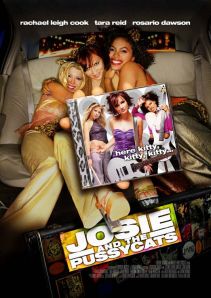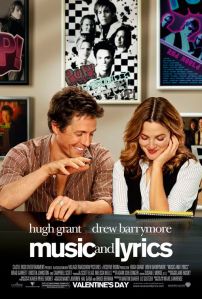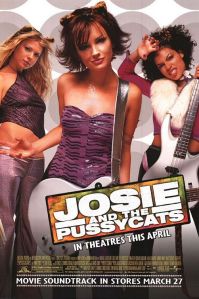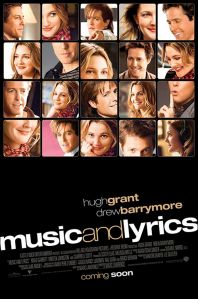

We are taking a slightly different journey this week with MIWETS (Yeah, not a great acronym). I would not really say the films I am going to focus on are guilty pleasures but many film fans might turn their noses up at such crassly commercial projects. One film exploits a TV show comic book legacy and the other one comes from one of the most resented genres among movie fans, the romantic comedy. I think each film actually has some merits that could be discussed in a passionate way because I have seen some hate for these films online. Neither film is essential, seminal or serious in any way. The two movies have one thing in common that moved me to pair them like this. Each one is a version of a nearly extinct form of film making, the original film musical.
It is true that we occasionally get a musical in an animated movie, or that a stage musical is adapted for the big screen. Those are rare enough however that even Disney cannot be counted upon for regular versions of this form. In the 1980's, music videos were basically inserted into movies to make them musicals, think "Flashdance" or "Footloose". They worked well enough to bring in the music but audiences not used to actors breaking out in song would probably not go for a modern version of fifties style musicals. The safe bet has been to put stage musicals on the screen. The two films I am focusing on here try to varying degrees to use the format of "An American in Paris" or "A Star is Born". They take an original story that includes music and then adapt it to movie form. Both use a backstage perspective, so the songs are connected to public performances, and not just singing as the characters walk down the street. It is for the music and particularly the songs that I have included them in this series.
 The
first film of today's double feature is "Josie and the Pussycats" from
2001. Roger Ebert put it this way: "Josie and the Pussycats are not
dumber than the Spice Girls,
but they're as dumb as the Spice Girls, which is dumb enough." He gave
the movie a half star. While I have always appreciated Ebert as a film
critic, I have not always agreed with him and this is one of those
times. At this point in his life I think he had finally disconnected
from the audience relationship that had made his work with Gene Siskel
so effective, and he simply spouted off on something he did not get. In
his review he even gets picky about the term subliminal versus subaural,
and he got that wrong also. Subliminal refers to consciousness which is
the correct way in which it is used in the film, subaural is below the
ear, and means nothing in this context.
The
first film of today's double feature is "Josie and the Pussycats" from
2001. Roger Ebert put it this way: "Josie and the Pussycats are not
dumber than the Spice Girls,
but they're as dumb as the Spice Girls, which is dumb enough." He gave
the movie a half star. While I have always appreciated Ebert as a film
critic, I have not always agreed with him and this is one of those
times. At this point in his life I think he had finally disconnected
from the audience relationship that had made his work with Gene Siskel
so effective, and he simply spouted off on something he did not get. In
his review he even gets picky about the term subliminal versus subaural,
and he got that wrong also. Subliminal refers to consciousness which is
the correct way in which it is used in the film, subaural is below the
ear, and means nothing in this context.The film is a cute girl-empowering satire on marketing. It is not about how a band is put together or even how it might become successful, it is about how that band might then be exploited to sell other stuff. Is the movie subtle? Hell no, it is obvious and goes for very big jokes, most of them visual. It is clear that the brands in the movie are being marketed in product placement as a way of mocking that placement. Lots of other films or Television shows would be viewed as cutting edge for the type of humor that is attempted here and for trying to reach the audience that the film is trying to appeal to. I can accept that others may not like the humor or that the story is a bit obvious but I am defiant in my belief that the music in this film is worthy and that's why I want people to see the movie.
I love a good title song, but a song that is part of the story and is integrated into the themes is the type of song I think makes a movie work as a musical experience. "Josie and the Pussycats" has at least three great songs that make the story memorable. Ebert wrote "The music is pretty bad. That's surprising, since Kenneth "Babyface" Edmonds is one of the producers, and knows his way around music. Maybe it's supposed to sound like brainless pre-teen fodder, but it's not good enough at being bad to be funny, and stops merely at the bad stage." It's silly to get into a debate with a dead man but come on, just saying it without explaining it is the worst appeal to authority there is. Ebert was not a music authority, and to be fair, neither am I but I'm willing to at least explain my position. To start let's take "Pretend to be Nice":
This song has a very appealing guitar lick, a fun chorus and a wicked hook that keeps pulling us in. Yes it is pop, but listen to the refrain "pretend to be nice" when sung by the lead in a mock low key sexy voice. There is real sarcasm there. It fits in as an example of the kind of song a girl band might be expected to play. It is smarter than any Spice Girls song and I think that undermined the belief that this movie was about bad music, it was about mocking bad music by taking it's form and subverting it.
Example Number Two is "three small words". This is an up tempo power pop song that gives the Pussycats the perfect opportunity to insert a performance based music video into the film. Look and listen:
Anyone who doesn't appreciate that song just doesn't understand that Heath Ledger is the new Matt Damon.
The ultimate example of the musical bliss of "Josie and the Pussycats" however is not provided by the title group. Instead the greatest example of musical subversion is done by the Boy Band that the Pussycats are being used to replace in the movie. I think Ebert must have missed the lyrics or have been totally unfamiliar with the Backstreet Boys or *NSYNC. "DuJour", provides the moment of musical genius early on in the film and if you listen to the song you will know how to listen to the songs in the rest of the movie. Here is the final nail in the coffin of the naysayers for this film:
"just cuz i slip in back doors,
well, that doesn't make me, hey!"
That just summarizes the whole music scene of the early 2000s. Maybe it isn't something everyone should see, but it certainly isn't something that everyone should reject. I may come back and defend the story, actors and whole film in another place, but for now the focus is on the music and it works the way it is supposed to in the film.
After a brief intermission, it is time to move on to the second film in this musical extravaganza.
 "Music and Lyrics" from 2007, is a much more
conventional film. It is a romantic comedy that features music and both
embraces and mocks the taste of popular culture. It features two of the
most appealing stars of the last twenty years, Hugh Grant and Drew
Barrymore, who between them have as many romcoms under their belts as
anyone this side of Tom Hanks and Meg Ryan. This movie was moderately
successful at the box office and has almost certainly a bigger audience
than the first movie and it also has some great music designed
explicitly for the purpose of the story.
"Music and Lyrics" from 2007, is a much more
conventional film. It is a romantic comedy that features music and both
embraces and mocks the taste of popular culture. It features two of the
most appealing stars of the last twenty years, Hugh Grant and Drew
Barrymore, who between them have as many romcoms under their belts as
anyone this side of Tom Hanks and Meg Ryan. This movie was moderately
successful at the box office and has almost certainly a bigger audience
than the first movie and it also has some great music designed
explicitly for the purpose of the story.The setting of the love story here involves the accidental meeting of two people who have complementary artistic skills but conflicting social skills. No one will be surprised by the development of the love story, it has the usual cute meet, slow romance, complication and then satisfying resolution. So it is all formula, but it is a formula that works because of the extra ingredients that get ladled on top. To begin with, Grant plays a semi washed up pop star from the 1980s. If you can imagine Duran Duran and Wham having children, the result would probably be the fictional band "Pop". Here in the title sequence of" Music and Lyrics" is the video for their biggest imagined hit:
This is a pretty perfect spoof of 80s pop video. The little sideways booty snap would fit into almost any George Michael video of those times. The song is a lightweight confection that illustrates the weightlessness of music from that period. Even though it has no heft to it, there is still significance to it. People are moved by music and while we may not appreciate someone else's taste in songs, to that person the song matters. That is shown in a couple of ways in this film. First through the hysterical behavior of middle aged women reliving their wild teen years at nostalgia performances by Grant's character Alex Fletcher. Yet we also see that the music can be inspirational to the next generation when Cora Corman, a Britney Spears knock off hires Alex to pen a new tune for her because she was a fan of the video.
A short clip of her current music video tells us all we need to know about how deep she is:
The creative process is something that is hard to visualize on screen. Painters in films get montages of images swirling as they put their imagination on the canvas. Writers are usually depicted as reflecting on their "inner eye" and recalling the story they want to tell. In a romantic comedy about writing a pop song we get a nice sequence showing how a last minute demo track comes together as the two co-writers race against a deadline. Here is how it is envisioned in the film:
What you see is not a complete version of the song but the romantic comedy version of the creative process. It works at building character and also shows us how the two miss matched lovers are going to come together. I think it is a very effective sequence and it has the advantage of having something to do with the story. Later in the movie we will get a more complete version of the song that will help cement our happy ending and irritate all those who hate Romantic Comedies in the first place, but as a song, this piece of music works as it is intended.
There is one other link between these films. Many of the songs share a common composer; Adam Schlesinger. He is the genius behind the song that made "That Thing You Do" one of my "Perfect Films". Probably best known for leading his band "Fountains of Wayne" onto the charts with "Stacy's Mom", Schlesinger has contributed to a number of songs in films and his work makes both of today's movies something I want everyone to see. The songs are not simply pop music inserted into the closing credits, but they are integral parts of the movies that they come from. That seems like a better standard for a movie music award than how big the pop star is that wrote it. If you can think of some songs from movies that drive the story, explain the characters or enliven the pace of the film, please share them. MIWETS is all about sharing the love.
Richard Kirkham is a lifelong movie enthusiast from Southern California. While embracing all genres of film making, he is especially moved to write about and share his memories of movies from his formative years, the glorious 1970s. His personal blog, featuring current film reviews as well as his Summers of the 1970s movie project, can be found at Kirkham A Movie A Day.










